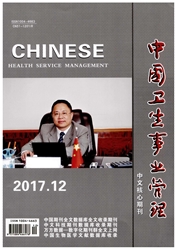

 中文摘要:
中文摘要:
目的研究基本药物制度实施后,J市乡镇卫生院医疗人力资源数量与质量的相对与绝对变化趋势,从而为维护和提升人力资源水平提供依据。方法:通过对机构数据与医生、管理者意向的描述性分析,从绝对数量与结构变化、工作负荷、岗位需求变化影响和态度4个层面研究基本药物制度实施后,乡镇卫生院医疗人力资源数量与质量的变化趋势。结果:调查乡镇卫生院医疗人力绝对数量与结构无变化,但工作负荷上升,存在一定程度的职业人力资本贬值,态度型人力资本有所提高。结论:管理部门与乡镇卫生院应优化人力资源管理政策,加大培训力度,落实好人岗匹配,进一步提升医疗人力资源水平。
 英文摘要:
英文摘要:
Objective To study the change trend of medical human resources "after the implementation of basic pharmaceuticals system in township health centers of J City, and provide references for improving human resources management. Methods Based on data of township health centers and descriptive analysis of doctors and managers, the change trend of medical human resources after the implementation of basic pharmaceuticals system in township health centers was analyzed from four aspects of absolute quantity and structure, working load, change of job requirement and attitude. Results No change was observed in absolute quantity and struc ture of township health centers. But the working load and attitude human capital kept increasing. And the occupational human cap ital was depreciated. Conclusion The policies of human resources management should be optimized. And training needs to be inten sified to improve the medical human resources management.
 同期刊论文项目
同期刊论文项目
 同项目期刊论文
同项目期刊论文
 期刊信息
期刊信息
